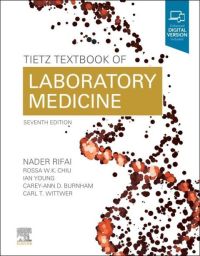Use THE definitive reference for laboratory medicine and clinical pathology! Tietz Textbook of Laboratory Medicine, 7th Edition provides the guidance necessary to select, perform, and evaluate the results of new and established laboratory tests. Comprehensive coverage includes the latest advances in topics such as clinical chemistry, genetic metabolic disorders, molecular diagnostics, hematology and coagulation, clinical microbiology, transfusion medicine, and clinical immunology. From a team of expert contributors led by Nader Rifai, this reference includes access to wide-ranging online resources on Expert Consult — featuring the comprehensive product with fully searchable text, regular content updates, animations, podcasts, over 1300 clinical case studies, lecture series, and more.
New to this edition
- NEW! 19 additional chapters highlight various specialties throughout laboratory medicine.
- NEW! Updated, peer-reviewed content provides the most current information possible.
- NEW! The largest-ever compilation of clinical cases in laboratory medicine is included with print purchase on Elsevier eBooks+.
- NEW! Over 100 adaptive learning courses included with print purchase on Elsevier eBooks+ offer the opportunity for personalized education.
Key Features
- Authoritative, current content helps you perform tests in a cost-effective, timely, and efficient manner; provides expertise in managing clinical laboratory needs; and shows how to be responsive to an ever-changing environment.
- Current guidelines help you select, perform, and evaluate the results of new and established laboratory tests.
- Expert, internationally recognized chapter authors present guidelines representing different practices and points of view.
- Analytical criteria focus on the medical usefulness of laboratory procedures.
- Use of standard and international units of measure makes this text appropriate for any user, anywhere in the world.
- Elsevier eBooks+ provides the entire text as a fully searchable eBook, and includes animations, podcasts, more than 1300 clinical case studies, over 2500 multiple-choice questions, a lecture series, and more, all included with print purchase.
Author Information
By Nader Rifai, PhD, Professor Department of Pathology Harvard Medical School; The Louis Joseph Gay-Lussac Chair in Laboratory Medicine Boston Children's Hospital and Director of Clinical Chemistry Laboratory Medicine Boston Children's Hospital Boston, Massachusetts
SECTION I: BASICS OF LABORATORY MEDICINE
1. Laboratory Medicine
2. Statistical Methodologies in Laboratory Medicine: Analytical and Clinical Evaluation of Laboratory Tests Medical Laboratory
3. Governance, Risk, and Quality Management in the
4. Specimen Collection and Processing
5. Preanalytical Variation and Pre-Examination Processes
6. Quality Control of the Analytical Examination Process
7. Standardization and Harmonization of Analytical Examination Results
8. Biological Variation and Analytical Performance Specifications
9. Establishment and Use of Reference Intervals
10. Evidence-Based Laboratory Medicine
11. Biobanking
12. Laboratory Support of Pharmaceutical, In Vitro Diagnostics, and Epidemiologic Studies
13. Machine Learning and Big Data in Laboratory Medicine
14. Laboratory Stewardship and Test Utilization
15. Principles of Basic Techniques and Laboratory Safety
SECTION II: ANALYTICAL TECHNIQUES
16. Optical Techniques
17. Electrochemistry and Chemical Sensors
18. Electrophoresis
19. Chromatography
20. Mass Spectrometry
21. Sample Preparation for Mass Spectrometry
22. MALDI-TOF Mass Spectrometry Applications in Infectious Diseases
23. Development and Validation of Small Molecule Analytes by Liquid Chromatography-Tandem Mass Spectrometry
24. Proteomics
25. Enzyme and Rate Analysis
26. Immunochemical Techniques
27. Microfabrication and Microfluidics and Their Application in Clinical Diagnostics
28. Cytometry
29. Automation in the Clinical Laboratory
30. Point-of-Care Testing
SECTION III: CLINICAL CHEMISTRY-ANALYTES
31. Amino Acids, Peptides, and Proteins
32. Serum Enzymes
33. Tumor Markers
34. Kidney Function Tests
35. Carbohydrates
36. Lipids and Lipoproteins
37. Electrolytes and Blood Gases
38. Hormones
39. Vitamins and Trace Elements
40. Iron Metabolism
41. Porphyrins and the Porphyrias
42. Therapeutic Drugs and Their Management
43. Clinical Toxicology
44.Toxic Elements
45.Body Fluids
SECTION IV: CLINICAL CHEMISTRY-PATHOPHYSIOLOGY
46.Nutrition: Laboratory and Clinical Aspects
47.Diabetes Mellitus
48.Cardiac Function
49.Kidney Disease
50.Disorders of Water, Electrolytes, and Acid-Base Metabolism
51.Liver Disease
52.Gastric, Intestinal, and Pancreatic Function
53.Monoamine-Producing Tumors
54.Bone and Mineral Metabolism
55.Pituitary Function and Pathophysiology
56.Adrenal Cortex
57.Thyroid Disorders
58.Reproductive Endocrinology and Related Disorders
59.Pregnancy and Its Disorders
SECTIONV:GENETICMETABOLICDISORDERS
60.NewbornScreeningandInbornErrorsofMetabolism
61.Inborn Errors of Metabolism: Disorders of Complex Molecules
SECTION VI: MOLECULAR DIAGNOSTICS
62.Principles of Molecular Biology
63.Nucleic Acid Isolation
64.Nucleic Acid Techniques
65.Genomes,Variants,andMassivelyParallelMethods
66.Clinical Genome Sequencing
67.Molecular Microbiology
68.Genetics
69.Solid Tumors
70.Hematopathology
71.Circulating Tumor Cells and Circulating Nucleic Acids in Oncology
72.CirculatingNucleicAcidsforPrenatalDiagnostics
73.Pharmacogenetics
SECTION VII: HEMATOLOGY AND COAGULATION
74.Automated Hematology
75.LeukocyteMorphologyinBloodandBoneMarrow
76.Red Blood Cell Morphology and Indices: The Clinical Chemistry Interface
77.Hemoglobin and Hemoglobinopathies
78.Enzymes of the Red Blood Cell
79.Physiology of Hemostasis
80.Platelets and von Willebrand Factor
81.Coagulation, Anticoagulation, and Fibrinolysis
SECTION VIII: MICROBIOLOGY
82.Introduction to Infectious Diseases
83.The Role of the Clinical Laboratory in Infection
Prevention and Antimicrobial Stewardship
84.Bacteriology
85.Antimicrobial Susceptibility Testing
86.Mycobacteriology
87.Mycology
88.Parasitology
89.Virology
SECTION IX: TRANSFUSION MEDICINE
90.Blood Group Systems and Pretransfusion Testing
91.Blood Components, Product Modifications, and Blood Donor Screening
92.Indications for Transfusion: RBCs, Platelets, Plasma,and Cryoprecipitate
93.Transfusion Reactions and Adverse Events Associated With Transfusion
SECTION X: CLINICAL IMMUNOLOGY
94.Systemic Autoimmune Disease
95.Transplant, Solid Organ
96.Hematopoietic Cell Transplantation
97.Transplant Compatibility Testing
98.Monoclonal Antibody Therapeutics and Immunogenicity
99.Allergy Testing
100.Primary Immunodeficiencies and Secondary Immunodeficiencies
APPENDICES
Appendix A: Reference Information for the Clinical Laboratory
Appendix B: Answers to Multiple Choice Questions


